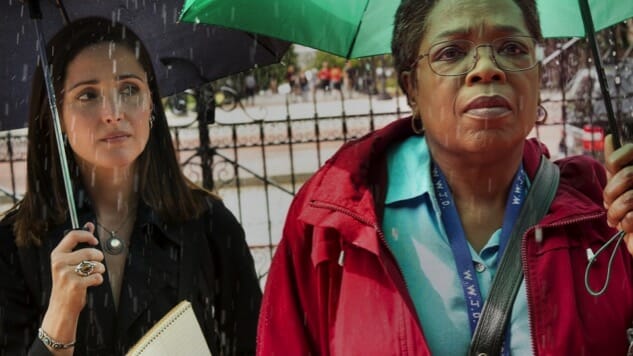We’ve Been Bamboozled: The Immortal Life of Henrietta Lacks Centers a White Woman’s Gaze on a Black Family
HBO
About 15 minutes into HBO’s highly anticipated The Immortal Life of Henrietta Lacks, I realized I’d been tricked. Hoodwinked. Bamboozled. Led astray. Run amok. According to the press release, the trailer and all manner of publicity associated with the film’s release, this was to be a story about the life of Henrietta Lacks, “as told through the eyes of her daughter, Deborah Lacks.” Unfortunately, this is not an accurate description of director George C. Wolfe’s movie. If you were under the impression that Oprah Winfrey, playing Deborah, was the star of the movie, you were also led astray. The star of this tale—a tale about a black woman whose cells were unwittingly taken by white doctors (who would go on to lie about her name, among many other things), and her black family’s struggle to learn about her life, death and immortality—is none other than Rose Byrne. Byrne is a white woman, playing a white science journalist who becomes fascinated by Lacks’ tale and goes on to write the book, The Immortal Life of Henrietta Lacks. The film is told from her perspective, and although Winfrey’s Deborah plays a large part, it is ultimately a movie about one white woman’s fight to bring justice to the legacy of Henrietta Lacks. And everyone gets in her way—white people in the medical field and, wait for it, even the black family she’s trying to help. According to this film, Skloot suffered many setbacks, particularly in the form of the distrusting Lacks family, and nevertheless, she persisted.
I know you want to believe I’m exaggerating, and I want to believe it, too. Because, after all, it just can’t be. It can’t be that Hollywood could take a story that has everything to do with a black woman, her family and her legacy and still manage to make it about a white woman. It can’t be that Oprah Winfrey would allow her own, wildly fascinating and passionate role to somehow play second fiddle, in a film that she’s also producing. And to be clear, Deborah Lacks is an interesting character, and Winfrey delivers a strong performance. The film might have even succeeded, if the same could be said for Byrne’s character. But for some reason, Byrne (whose previous work I’ve always respected and enjoyed) is practically one-note here: a constantly smiling but oft-confused woman in the midst of Deborah’s unpredictability and mental and emotional instability.
Not once do we ever learn why Rebecca Skloot was so captivated by the story of Henrietta Lacks. She has no personal life, no backstory, no passion behind her eyes (until one quite explosive scene towards the end of the film—literally one scene where she becomes something recognizably human, instead of the robotic, well-meaning caricature she plays for the duration of the film). Had she been a well-written, captivating and compelling individual (and I suspect the real Rebecca Skloot probably is), the film still would have had no business centering her experience over Deborah’s, but at least the racism of it all might have played better. And I know it pains you to hear that, too: that The Immortal Life of Henrietta Lacks is a racist rendering of a story you so wanted to learn about. But what else can we call it? I can use words like “de-centering” or “erasure,” but sometimes we have to call it like it is. Towards the end of the film, Deborah Lacks looks into Rebecca Skloot’s eyes and says, “You gotta promise me something: You can’t let me or nobody else stop you from writing this book.” In this moment, Lacks admits that she needs Skloot to accomplish this great task and she admits that even she might get in the way. Well, luckily for all of us, Skloot persisted.
And it’s not just Deborah: Everyone in this film is presented as off-the-wall, odd, possibly dangerous (like the one brother who spent a good deal of time incarcerated) or just plain crazy—everyone except for Skloot. The Lacks family has been lied to so many times by institutions like Johns Hopkins University, and by journalists and lawyers, that they’ve no reason to trust one more person who says they have their best interests at heart. Some of the members of the family, including Deborah, struggle from mental health issues, all of which feeds into their paranoia about who she is and what she wants. But what’s offensive about the film is that every wild outburst (and there are many, from the Lacks) is presented through the eyes of Skloot. She is consistently shocked or embarrassed when these outbursts take place; every other scene seems to consist of Skloot, always even-toned and measured, trying to calm down Deborah, or explain science and procedure and other things to poor Deborah, who just doesn’t understand half the time. I suspect the writers (Peter Landesman, Wolfe and Alexander Woo) thought they were, at least, telling the story of two women on a mission to bring justice to Lacks’ story, as Deborah and Rebecca’s scenes make up the majority of the movie. But it’s Rebecca’s perspective that carries us from the start of the film to the end.
-

-

-

-

-

-

-

-

-

-

-

-

-

-

-

-

-

-

-

-

-

-

-

-

-

-

-

-

-

-

-

-

-

-

-

-

-

-

-

-








































